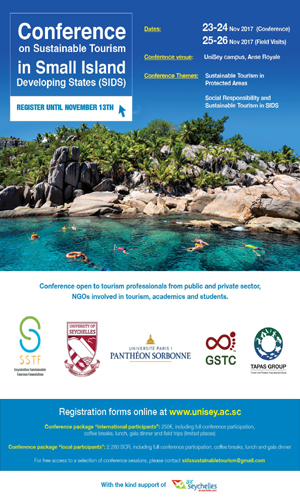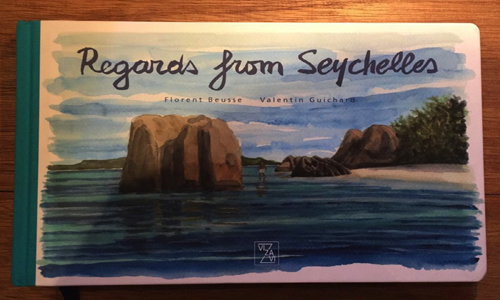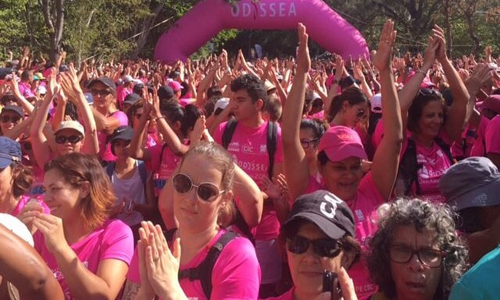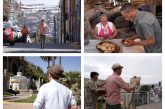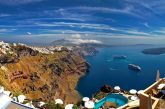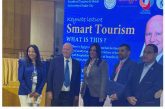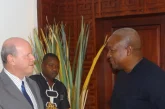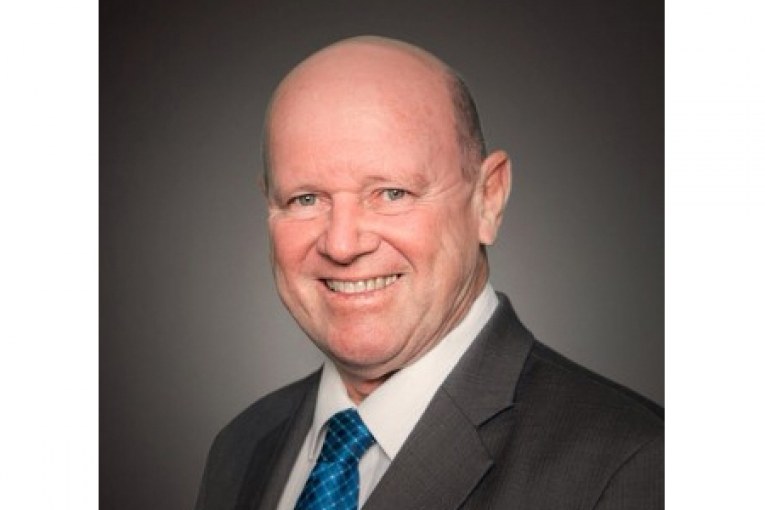
By Alain St.Ange of SAINT ANGE CONSULTANCY
Your link to Issue 23 of the 12th November 2017:
http://mailchi.mp/ 9ea46e4655e2/saint-ange- tourism-report-23rd-edition
Welcome to Edition 23 of 12th November 2017
Today we look to the bible for guidance and this Proverb 13:3 NIV can be a relevant guide:-
“Those who guard their lips preserve their lives, but those who speak rashly will come to ruin”
Another tourism trade fair has come and gone and this time it was the WTM (World Travel Market) of London. It is expensive to be at such events, but everyone in the world of tourism knows that it remains a must. Visibility is relevance and the drive for a successful tourism industry is this. Relevant holiday destinations are seen by Tour Operators and the press fraternity. Tour Operators look and compare existing & new products, the coming seasons prices and accessibility to the destination and then plan their next year’s programs accordingly.
Wanting what is best for Seychelles is the focus of this Tourism Report and today we need to touch on the question of security and public safety. This remains a topical issue and many in the tourism industry of Seychelles are all looking at what can be done. We need to be reminded of the years 2006 to 2012 when the SHTA (Seychelles Hospitality & Tourism Association) set up an inclusive public safety committee under the Chairmanship of local hotelier Christopher Gill of Praslin.
That Committee’s program of action was very successful at reducing crime by 10% up to 20% in its last year of operation before it was discontinued. This is remembered as a great example of positive private / public sector partnership that showed the trade is willing and able to deal with crime when it surges. Is it time to revive such a successful initiative?
It is Budget time in Seychelles and the time is right to implore the State and local banks to look at the potential gains if local businesses were encouraged to upgrade ageing facilities, expand working ventures or innovate by looking at new support facilities. The call to have reduced interest rates is now. The time to lend and see development accelerate is now. Seychelles needs more 3 – 4 star properties to ensure the back of the planes flying here have the load factor they need. That development could be Seychellois driven. Claim back your tourism industry has been a call made by Seychelles to the Seychellois People. This has resulted in many ordinary Seychellois joining this industry that remains the pillar of the island’s economy not just as employees, but also as investors. The country owes these committed Seychellois the support to grow their business and to help them consolidate their businesses, and this is where the applicable interest rate can play its part.
Blue Economy is topical and is finally being embraced by everyone. It is good to see that a new book “A Layman’s Guide to the Blue Economy” is being prepared. For Seychelles to succeed in this drive, we shall need the people to not only embrace the call, but to also understand it. Congratulations to those behind the new book.
Finally, it is important to again today acknowledge all who are diligently re-posting the Saint Ange Tourism Report weekly. Our Report ranges far and wide, from Australia to the Americas, from the Indian Ocean Vanilla islands to Africa & Asian and Greater Europe, with your continued support, which is greatly appreciated. You are helping us to go from strength to strength with each new Edition.
Enjoy the read,
Alain St.Ange
Saint Ange Consultancy
BRINGING EUROPE AND THE SEYCHELLES CLOSER TOGETHER
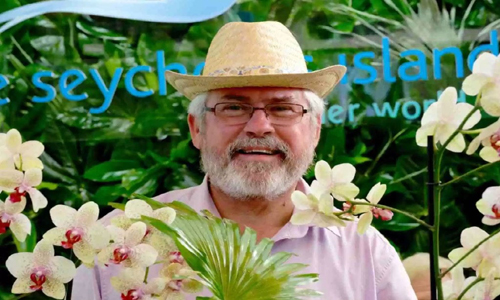
(Exclusive Interview: Ambassador Maurice J. L. Lousteau-Lalanne, Minister for Tourism, Civil Aviation, Ports and Marine, Republic of Seychelles)
How is tourism growth being promoted in the Seychelles today? We put the question to Ambassador Maurice J. L. Lousteau-Lalanne, Minister for Tourism, Civil Aviation, Ports and Marine, Republic of Seychelles.
There are two things. The first is in relation to air access to the Seychelles. For some time now, access from Europe to the Seychelles has always been via the Gulf. The European market has been crying for direct flights, and we have now managed, in 2017, to negotiate and have more direct flights to the Seychelles. As you know, Air Seychelles was the only carrier running three services a week from Paris, but now British Airways and Air France will start direct flights, beginning in summer 2018. So, that gives our main source market, which is Europe, much better connectivity, and will bring back different segments, especially from the UK market. Austrian Airlines will begin direct flights from Vienna this winter as well.
What about new hotels?
In March 2018, the new Four Seasons Hotel will open its doors, and in 2019, Beachcomber will reopen. They had been operating an 80-room hotel, and they will reopen with a 295-room property. There are two other projects. One is on an island 60 nautical miles south of the Seychelles, a five-star 60-villa property. And Ritz Carlton will be opening a new resort in 2019.
What makes the Seychelles different and unique?
There are two things. The first is that when we started tourism in July 1971 with the opening of the airport, we realised from day one that the only thing we have is the natural beauty of the Seychelles, and this is what we are still selling. We did not invent the word ecotourism. We did not invent the word sustainability in tourism, but we have been practicing both of those principles since 1971. And today, the one attraction we offer is the natural beauty of the Seychelles in its pristine condition. To achieve this, we have kept the Seychelles in the upper segment. It’s not cheap, but I can say that Seychelles today is by far the safest destination of its kind. It’s becoming more affordable as the competition heats-up, and we still offer that natural beauty we need to preserve for generations. Otherwise if we lose that we have nothing else to offer
What’s happening with the Vanilla Islands project at the moment?
It’s a project that started a long time ago with some European Union financing. We created an identity, and then it fizzled out, because we couldn’t get the air access sorted out. And then recently, the former Minister of Tourism of the Seychelles, Alain St.Ange rekindled the idea, and the Vanilla Islands today is more structured. In fact, we have a meeting here at IFTM of the Vanilla Islands. I think the first objective has to be to develop cruise tourism. This is more organic for our region. We need to invest some money and provide cruises between the Vanilla Islands. This is because we are islands at different levels of development in tourism. We cannot afford or expect all islands to reach the same level, so we have to start with something, and I think cruising lends itself very well. Then we need the air access. We need to think out of the box; we need to stop being over-protective of traffic rights between us, so that we can open up the market a bit more. That will be a second phase. We will need to get the COI – the Indian Ocean Commission – to agree to a more open sky policy within our region, then it will happen. There’s great potential. We all have different assets and complement each other, and it makes for a great holiday.
(Interview undertaken during IFTM Top Resa in Paris, France, for IFTM Daily – official magazine of the show) from Hotel & Tourism Online
The Layman’s Guide to the Blue Economy
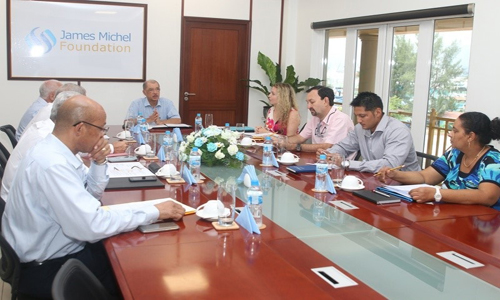
Small Island Developing States (SIDS) are limited by their small land masses and must look to the ocean, and the opportunities arising therefrom, in order to expand their economy. It is essential that the population understands the concept of the Blue Economy in order to harness the opportunities that exist and will emerge in order to reap the optimum results of this development strategy.
Although the phrase “Blue Economy” has been frequently used on national and international platforms, many people still struggle to understand the notion. This has prompted the innovative creation of a ‘Layman’s Guide to the Blue Economy’.
The objectives of the Guide include: sensitising the layman about what the Blue Economy concept actually is, presenting the existing industries/sectors that form part of the Blue Economy, presenting examples of other opportunities that exist but have not been tapped into locally and globally, and identifying the local support for people who want to venture into business ideas in the Blue Economy.
The James Michel Foundation, an NGO founded by the former President of the Republic of Seychelles, Mr James Alix Michel, has taken the lead in mobilising funding and sponsorship for the production of this Guide, which is expected to be published in the near future. This is an exciting new venture which will hopefully educate many on the concept of the ‘Blue Economy’ and encourage many to embrace it.
Learn more about the James Michel Foundation at: http://www.jamesmichelfoundation.org/
Happy Trails and Endemic Snails
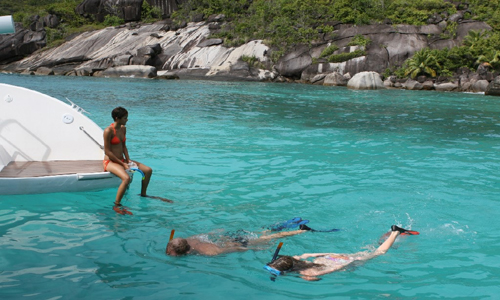
Last month’s launch of a new guidebook for hiking mountain trails throughout Seychelles’ main islands comes as a welcome development for an aspect of Seychelles that doesn’t get a lot of attention, at least not compared to the islands’ world-famous beaches.
The steeply rising crags that make up the inner islands of Seychelles – the only mid-ocean archipelago on earth of granite formation – offer not only wonderful vistas and some of the islands’ most photogenic scenes, but also host a treasure trove of endemic flora and fauna found nowhere else in the world.
Hiking in Seychelles, co-authored by Rémy Ravon and Romain Latournerie with the support of the Seychelles Tourism Board, will undoubtedly be a handy companion for many intrepid adventurers keen on exploring the peaks and valleys of Mahé, Praslin and La Digue.
For those with a true penchant for trekking through nature, there are additional ways to supplement one’s interest in the terrestrial side of the islands.
Mason’s Travel, one of the islands’ prominent inbound tour operators, has been keen to develop hiking activities for its guests, but in a way that’s accessible for those who may not have had much experience.
The company’s Peaks of Paradise excursion, for instance, includes a guided hike of about one hour along Mahé’s northwestern coast, which leads to the small hideaway of Anse Major beach where the guests then board Anahita’s 37-metre leisure catamaran for a lunch onboard. The passengers are then taken to Anse Diri in the Baie Lazare Marine Park for some additional snorkeling. Instead of trekking back the same way in the afternoon, guests can then enjoy a pleasant sail back to Victoria admiring the hillscape of the North coast of Mahe.
On request, Mason’s Travel also regularly calls on local naturalists, especially for those tourists keen on birdwatching or interested in discovering some of the islands’ rarer endemic species, such as the jellyfish tree, of which only a few are known to exist in the world, and only in Seychelles’ higher elevations.
To that end, an experienced guide can mean all the difference between a nice hike and a truly fascinating ecological experience. Someone who can recognise the surprisingly loud chirps of the sooglossidae, a tiny frog the size of a fingernail, or the calls of the elusive Scops Owl, will be in a much better position to find such hidden gems along certain trails, and provide insight into their behaviours.
For those going it alone, there are a few tips to remember. First, always go with a travel buddy for safety reasons, and second, take your time. It’s when you stop to catch your breath and look around that you’ll start to see all manner of life around you in the forests, whether it’s the small endemic snails with jet-black shells or tiny hedghogs – known locally as tenrecs – scurrying off into the bushes.
Classy, but unpretentious and very good…
“The Club Liberté’s Sushi Bar has the best of sushi” writes a repeat visitor to Seychelles
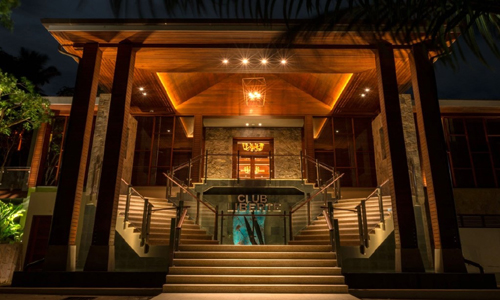
“Perfection, they say, is in the detail and perfection is difficult to attain. However, I would mark out the Club Liberté’s Sushi Bar as close to perfection as will be found on Mahe” a repeat visitor took the trouble to write.
“It is all detail. It is the pointillism of food; the effect achieved through the accretion of tiny individual gestures. It’s good, it’s very good. If my intention were solely to make sure the place was full, this is maybe overkill. I could probably fill it by knocking on the doors of my neighbours and telling them the good news, as the sushi bar is small. Inside the Club Liberté Casino, there is a dedicated section of the bar that seats seven, spaces which can be booked. Plus there are several tables for two or more.
The sushi bar is run by chef “itamae” Federico. Federico, who picked up the nickname “Derik” while an apprentice in Manila, served for a number of years as sushi chef at some pretty exotic places around the world. There is nothing exotic, praise be, about the food here. It is just straight up sushi – nigiri, temaki and maki – and sashimi (with the occasional hand roll). There are no hot dishes, not even miso soup. Well yes, there is the deep fried maki. Nor are there any desperate attempts to bring something arch and contemporary to the classic Japanese repertoire. It’s far better than that. All of it is made by Federico and Federico alone, right in front of you. If you are in a hurry, don’t be, perfection takes time.
A plate is laid before you. A mound of pickled ginger and wasabi is placed to one side. The fun may now begin. Of course, sitting at the bar is more than just theatre. Sushi is best consumed seconds after it’s prepared, with the barely cool or room temperature fish being gently heated by the warm, vinegared rice. Federico may admonish diners who snap phone pics of the prepared sushi; there’s no photography ban here, he just wants you enjoy the fish, while it is perfect.
While items can be ordered individually, there are also set menus or omakase, priced very reasonably. What’s in them is decided by the chef, depending on what’s good. We asked for octopus. He told me he had some, but we couldn’t have it. “I tasted it,” he said. “It’s not good enough.” Okay then. He said this without being condescending or grand. Indeed, there is nothing self-regarding or intimidating about Federico. Watching him work is a joy, but he’s also good company.
A mid-ranged sashimi selection brought glistening pieces of snapper, bonito, tuna, salmon and the sweetest of sweet prawns. The nearest thing to adornment was the citrus juice, brushed lightly across pieces of snapper. The nigiri here is the whole package, which is to say the rice is exactly how you always wish it might be and so rarely is. It is the right side of just warm.
The vinegared edge is there without being overstated. The grains cling to each other without being needy. On to these pillows, formed by hand in front of you, go snapper, or strips of salmon, or a piece of octopus which has been so finely sliced half the way through by his knife as to look like bleached-out marquetry. There is a delicate brush with soy. A strip of toasted seaweed is used to form a collar to hold back a cluster of orange roe. Marinated octopus, laid with a blob of sauce, disintegrates in your mouth to release its oils.
I was once told that telling properly good sushi from the rest was a tricky business; the food was so very simple that difference could be measured in tiny points. I understood what they meant. Making it is a job for obsessives and so is eating it. So when the good sushi comes your way, you just know it. There are cheaper places to eat sushi on Mahe, and there may be hipper places too. But right now I honestly don’t believe there is any better place than Federico’s at the Club Liberté” the visitor went on to say.
Congratulations to Club Liberté. Word of mouth is what gives a property the edge.
The Sushi Bar is open Tuesday to Sunday, 18h00 to 02h00.
Regional Conference on Sustainable Tourism in SIDS
In the framework of the 2017 UN International Year for Sustainable Tourism for Development this conference wishes to provide a platform for tourism professionals, academics and practitioners from the Seychelles, other SIDS and the region to discuss an integrated practical approach to sustainable tourism in SIDS.
For this event, the SSTF, and the University of Seychelles (Department of Tourism and Cultural Heritage) partnered up with the IUCN World Commission on Protected Areas’ Tourism and Protected Areas Specialist Group (TAPAS group), the Global Sustainable Tourism Council (GSTC) and the Paris Tourism Sorbonne Institute of Research and Higher Education in Tourism (IREST), to organize a regional conference on sustainable tourism in SIDS, which will combine academic tourism research with practical best practice examples. The conference aims at connecting the various stakeholders working and researching the environmental and socio-cultural development of the tourism industry, for constructive discussions and networking.
With the GSTC as our conference partner and the SSTF pursuing a five-year vision for Seychelles to be certified sustainable by a certification body that is GSTC accredited, it is an important step for us to bring stakeholders together and exchange best practices, network and pave the way forward for the destination certification. Randy Durband, the CEO of the GSTC and an international sustainable tourism expert, will be the key speaker of the event and can share his vast experience with conference attendants.
Book “Regards from Seychelles” coming soon
A new book by Valentin GUICHARD and Florent BEUSSE is said will be an invitation for all to discover Seychelles. The book will be launched in Seychelles on the 14 December.
The book will be presenting Seychelles with a poetic approach with the island’s long beaches, its plantations and everything that stands as the soul of these mid-ocean islands.
Florent Beusse has captured the sights of the Seychelles on magnificent aquarelles or drawings with ink, Valentin Guichard finished the project with the most appropriate of texts.
The writings and the paintings have been joined to entice visitors to better appreciate Seychelles as a holiday destination with a difference.
The Book has 95 aquarelles and drawings with 25 accompanying texts.
Valentin GUICHARD, is a Franco-Seychellois, born in 1994 and followed part of his schooling at the école française of Victoria.
Florent BEUSSE on his part was born in 1969 and started drawing since junior school. He moved to the Indian Ocean and settled between Mauritius and Reunion islands as head of the Atoba Communication Agency.
Reunion hosts its 10th edition of Odyssea to support the fight against breast cancer
Didier Robert, the Regional President of Reunion joined thousands in what Reunion called the 10th edition of Odyssea in their fight against breast cancer.
President Didier Robert congratulated Nathalie Bourcier and all her Team of volunteers for another successful edition.
“The generosity and engagement of the Reunion Islanders for this cause is always so evident as it is for many of the causes preoccupying the island. Do not change anything. Let us remain committed as we are today” said President Didier Robert
PMAESA Conference 2017 in Victoria Falls Zambia – 22 and 23 of November
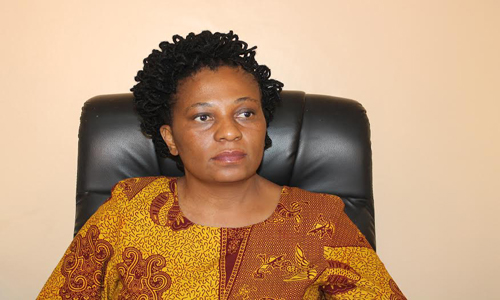
Nozipho P. Mdawe, Secretary General of PMAESA has confirmed from her PMAESA Secretariat in KPA Building No. 480038 of Kaunda Avenue, Kizingo in Mombasa, Kenya that the PMAESA Conference 2017 will be held in Victoria Falls in Zambia on the 22 and 23 of November under the theme:- Raising the Profile of Land-linked Countries in the Logistics and Maritime Value Chains.
PMAESA is doing their bit to rewrite the narrative for Brand Africa through this meeting that is set to bring countries together for the consolidation of Cruise Africa in all its dimension and that includes on lakes and waterways of the continent.
The Ports of Southern and Eastern Africa meeting will be opened on the 22 November with the KeyNote Address programmed to be delivered by Hon Inonge Mutukwa Wina, the Vice President of Zambia.
Opening remarks will be by Mr. Bisey /Uirab, Chairman, PMAESA Board and PAPC Council & CEO, Namibian Ports Authority with words of support to set the scene of this important meeting set to be echoed by Mr Davies Pwele, Head: International Finance: International Division – Development Bank of Southern Africa (DBSA), Prof. Said Adejumobi, Director, Sub-Regional Office, Southern Africa – United Nations Economic Commission for Africa (UNECA, SRO-SA), His Excellency Sindiso Ngwenya, Secretary General – Common Market for Eastern and Southern Africa (COMESA), His Excellency Kitack Lim, Secretary General – International Maritime Organisation (IMO) and Hon. Jean Bosco Ntunzwenimana, Minister of Transport, Public Works and Equipment – Republic of Burundi
The welcome addresses will be by Eng Meshack lungu, the Permanent Secretary of the Ministry of Transport of Zambia and by the Hon Eng Brian Mushimba, the Minister of Transport and Communications of Zambia.
The first Technical Session of this PMAESA meeting will be on The Blue Economy and its impact on Socio-Economic Development and it will be Chaired by – Mr. Davies Pwele, General Manager, International Division, DBSA.
The importance of maritime sector and cluster development in Land-linked Countries: what is the role and success factors of the maritime sector in Land-linked Countries will be presented by Hon. Minister Workneh Gebeyehu, Ministry of Transport and Communications, Ethiopia and Fundamentals, principles and policy framework necessary for the maritime sector to advance socio economic development for Land-linked Countries by Prof. Said Adejumobi, Director, UNECA, SRO-SA
The benefits of an integrated value chain approach in the identification, planning, financing and managing of intermodal nodes to boost Economic growth. What has and will work: A DFI approach by Mr. Seison Reddy, Head: Transport Sector, Development Bank of Southern Africa (DBSA)
Enhanced safety and security of the waterways in Land-linked Countries: whilst there is a strong link that exists between sectors and the interdependence of activities safety and security of the waterways remains pivotal for navigation, intermodal transportation and the maintenance of conducive marine environment by Mr. Boss Mustapha , Chief Executive Officer, National Inland Waterways Authority (NIWA)
Opportunities presented by the blue economy for inland waterways. Untapped opportunities to be supported by investment in order to create jobs and growth in land-locked countries and regions also by Captain John K. Mhango, Senior Deputy Director, Malawi Marine Department and Case studies: Shifting from dependence on raw commodity exports, lessons from Seychelles Blue Economy by Ms. Rebecca Loustau-Lalanne, Principal Secretary, The Blue Economy Department
Technical Session 2 will be on The impact and influence of Integrated Tourism and will be Chaired by Colonel Andre Ciseau, Chief Executive Officer, Seychelles Ports Authority (SPA)
Examining the link between land-based tourism and cruise tourism: What are the pros and cons of shore based excursions? Is it a “one size fit all” model? will be presented by Ms. Betty A. Radier, Chief Executive Officer – Kenya Tourism Board (KTB)
Emerging Maritime policies pertinent to advance the blue economy as well as opportunities in the land-linked countries by Mr. Dumisani T. Ntuli, Acting Chief Director, Maritime Transport Policy & Legislation, Department of Transport
The role of Integrated Tourism in developing an African Tourism Narrative: demographics and segmentation within the tourism sector to influence global competitiveness by Hon. Minister Charles Banda, Ministry of Tourism and Arts, Republic of Zambia
Cruise Africa Brand: Integrated Tourism Sector benchmark by Mr. Alain St.Ange, Former Minister of Tourism, Seychelles and the Case Study: East African Community Tourism approach by Amb. Liberat Mfumukeko, Secretary General, East Africa Community (EAC) and Yatch Lottery as a vehicle to segment and diversify integrated tourism
Mr. Vincent Didon, Business Development Manager, Seychelles Ports Authority
Technical Session 3A on Instruments for diversified Trade in Value Chains will be Chaired by – Ms. Prisca M. Chikwashi, CEO, Zambia Chamber of Commerce and Industry (ZACCI) and Technical Session 3B on Women Development in the Maritime and Logistics Sectors by Ministry of Gender, Republic of Zambia
Examining the link between trade, finance and industrial policies – what is the current picture in the region? The need to review policies to streamline trade and investment processes will be tackled bt Dr. Henry K. Mutai, Tralac Associate, TRALAC Trade Law Centre and What are the opportunities for women in the maritime & logistics sector in Land-linked countries? Ms. Meenaksi Bhirugnath-Bhookun, WOMESA Chairperson amongst many other interesting topics promising to make this PMAESA Conference 2017 a step forward for Brand Africa now the baby of minister Najib Balala, the Kenya Minister for Tourism and Head of CAF at the UNWTO.
The Zambian Minister of Transport & Communications has said that it will be his honour and privilege to welcome delegates to the inaugural ports management association of eastern and southern Africa Investor Forum. “In the Forty Five years of PMAESA’s establishment we seek to more eagerly and earnestly address the issues which will accelerate the development of port and maritime infrastructure. The Forum is strategically organised to take place during the year when Zambia is appointed Chair of the United nations group of Land locked Developing Countries.
The mission of the Chair is to work towards transforming all land locked countries into land-linked economically active countries. This is in fulfilment of Zambia’s strategy to be an integrated hub for Transport, Communications and meteorological Services in the Southern Africa region by 2030. Over the two days, we hope to unpack and discuss the priority port infrastructure projects with the view to accelerate their progress in reaching bankability. We will also share progress updates on the opportunities available in the water transport and maritime sector.
It is my hope that you will find the platform of benefit as we deliberate and exchange knowledge across the sector. We are here to support and encourage dialogue amongst senior decision makers and the relevant authorities with the view to demonstrating the interconnectedness of the maritime, shipping, logistics and infrastructure development.
We would like to extend our thanks and appreciation to our strategic partners, the Development Bank of Southern Africa for making this forum possible” Minister Hon. Eng. Brian C Mushimba, the Minister of Transport & Communications of the Republic of Zambia said.
Madagascar welcomes tourists with open arms after plague
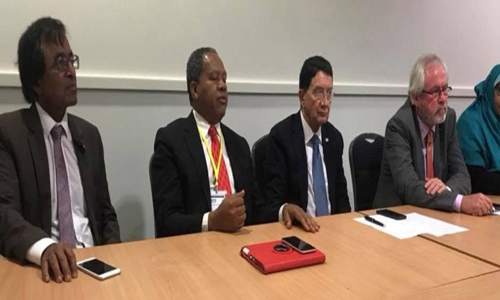
The message after a UNWTO crisis meeting in London this week was: Travel and Tourism to Madagascar is open again. Plague is history. Madagascar is ready to welcome tourists with open arms again. It was a day of relief today for Madagascar tourism and Roland Ratsiraka at the ongoing World Travel Market in London.
The Hon. Roland Ratsiraka, minister of tourism for the Indian Ocean island nation, had maneuvered through a tremendous problem after a plague outbreak. Today, fellow ministers and health officials, as well as the UNWTO, gave him a green light.
His island has a wealth to offer. The country is home to thousands of animal species, such as lemurs, found nowhere else, plus rainforests, stunning beaches, and reefs.
As of today, Madagascar is ready to welcome international tourists again. According to Taleb Rifai, Secretary-General of the United Nations World Tourism Organization, there is no more danger for a visitor to experience this beautiful Indan Ocean island country. Ministers from the neighboring countries including Mauritius, Seychelles, Mauritius, and Kenya met for 2 hours.
Madagascar is a member of the Vanilla Islands Tourism Organization and UNWTO.
The Hon. Minister Roland Ratsiraka told eTN that his nation is safe to be visited.
UNWTO Secretary General Taleb Rifai had visited Madagascar recently together with a high-level UNWTO delegation to express the organization’s full support to the tourism sector. Madagascar’s tourism was facing a challenging situation following a plague outbreak which has prompted some countries to implement travel restrictions with Madagascar. Mr. Rifai recalled the World Health Organization (WHO) advises no restriction on travel or trade to Madagascar.
Rifai explained today that modern health security procedures are in place in Madagascar. The body temperature for every arriving or departing airline passenger is taken (high body temperature is a clue the person may be infected).
Mr. Ratsiraka told eTN the crisis is over. He said: “What they need now are tourists.”
Maurice Loustau-Lalanne, Minister for Tourism, Civil Aviation, Ports and Marine for the Seychelles, announced Air Seychelles is expected to resume services to Madagascar shortly.
The Hon. Anil Kumarsingh Gayan, Minister of Tourism for Mauritius, voiced his support and said there are no longer any restrictions in place to travel from or to Mauritius to Madagascar.
Fatuma Hirsi Mohamed, Principal Secretary, Ministry of Tourism for Kenya, also had no objection to giving an all-clear for Madagascar.
Madagascar is open for tourism business.
Madagascar has been experiencing a large outbreak of plague affecting major cities and other non-endemic areas since August 2017
courtesy eTN
His Excellency Mr. Akbar Al Baker, wins award for greatest individual influence on the aviation industry
Qatar Airways Group Chief Executive, His Excellency Mr. Akbar Al Baker, has been named the ‘Aviation Executive of the Year’ by the CAPA Centre for Aviation, an independent body that provides market intelligence and data to the global aviation industry. H.E. Mr. Al Baker received the award at the organisation’s glittering gala dinner, held this evening in Singapore as part of the CAPA Asia Summit 2017.
The prestigious award recognises H.E. Mr. Al Baker’s influence on the aviation industry, demonstrating outstanding strategic thinking and innovative direction in shepherding the growth of Qatar Airways’ business and the wider aviation industry as a whole.
H.E. Mr. Al Baker said of the award: “It is a tremendous honour to be named the ‘CAPA Aviation Executive of the Year’ in this, a very special year for Qatar Airways, as we celebrate our 20th anniversary. We have come so far in the past 20 years, rising from a small regional carrier to become a global airline, committed to innovation and to delivering the highest standards to our passengers. Not only as an airline, but as a nation, we are tremendously proud of this accomplishment. In spite of the backdrop of an illegal blockade on our country, as we look ahead, we know that truly the best is yet to come.”
Executive Chairman of CAPA Centre for Aviation, Mr. Peter Harbison, said: “Akbar Al Baker has not let Qatar Airways lose its shine during one of its most testing years. Under his guidance, the airline has recalibrated its network to function without access to several neighbouring countries. At the same time, Qatar Airways has continued its expansion plans and created new avenues for growth. He has turned a setback into an opportunity. This is truly a remarkable achievement.”
H.E. Mr. Al Baker is one of the most influential figures in international aviation. Under his leadership, Qatar Airways has grown to become the world’s fastest-growing airline, operating one of the youngest and most technologically advanced fleets in the sky. A widely recognised and well-respected industry innovator, H.E. Mr. Al Baker was elected chairman of the Board of Governors (BoG) of the influential global aviation industry body International Air Transport Association (IATA), effective June 2018.
There was further cause for celebration as Qatar Airways also received the “Best Full Service Airline in West Asia” award for the third consecutive year at the Future Travel Experience Asia 2017 awards held on the same evening in Singapore. Qatar Airways’ home and hub, Hamad International Airport (HIA), was also named “Best Airport in West Asia” at that ceremony.
The airline’s commitment to the values of safety, security, innovation and quality of service has led it to receive numerous major awards this year, including the 2017 Skytrax ‘Airline of the Year,’ the fourth time it has received this award. It was also named ‘World’s Best Business Class,’ ‘Best Airline in the Middle East,’ and ‘World’s Best First Class Airline Lounge’ at this year’s Skytrax ceremony.
As a result of H.E. Mr. Al Baker’s innovative leadership, Qatar Airways launched its award-winning and game-changing Business Class seat, Qsuite, earlier this year. Qsuite offers a fully transformable suite of seats that allows parties of two, three or four to create their own unique space within the Business Class cabin. This game-changing patented design has transformed Business Class travel by bringing a First Class product to the Business Class cabin. Qsuite also features the first ever double bed in Business Class, a ground-breaking innovation that has set a new standard for the industry.
The award-winning airline continues to demonstrate a determined and record-breaking expansion plan recently adding an array of new destinations to its global route network, including Dublin, Republic of Ireland; Nice, France; Prague, Czech Republic and Kyiv, Ukraine, soon to be followed by Chiang Mai, Thailand; Canberra, Australia and St. Petersburg, Russia.
Now in its 20th year of operations, Qatar Airways has a modern fleet of more than 200 aircraft flying to business and leisure destinations across six continents.
Travel & Tourism for a common purpose
Pristine environment, turquoise blue seas, deserted beaches, lists of endemic birds and plants when catalogued highlights that there are few places more idyllic and inspiring than the Indian Ocean Vanilla islands.
But whilst visitors might describe it as paradise on earth, local communities often struggle with high levels of unemployment, difficult standards of living and lack of opportunity. Income from traditional activities like farming and fishing is under immense pressure. Younger people move to the cities in search of work. Old traditions and techniques are slowly lost. A WTTC recent post highlights that a recent study in Italy found that 2,500 villages across the country risked being abandoned owing to depopulation.”Tourism is uniquely placed to bring vitality and opportunities back to rural communities and in so doing, to encourage cooperation and community cohesion” from the WTTC post.
The post says that for the more curious traveller, looking for deeper connections with the places they visit, community tourism projects also offer a huge range of unique experiences and interesting learning opportunities.
‘Living like a local’ has become an essential part of a trip for many travellers and community tourism offers exactly these kinds of experiences. For example:
Learning about cocoa farming and chocolate production in Panama
Experiencing life in Aboriginal communities in Australia
Watching traditional tribal dancing at a community tourism project in Uganda
These are just some of the myriad community tourism projects around the world that offer vital income to people in rural areas by bringing tourists to places that they previously wouldn’t visit.
This was the spirit behind the East3Route program set up between the KwaZulu Natal of South Africa, the Kingdom of Swaziland, Mozambique and the Seychelles. Grass Root tourism was seen as a way countries to be successful in the long term. “People need to work together and that in turn strengthens communities” was the key message.
This is what villages in the Indian Ocean islands need to embark on. “When the rural tourism project in ‘The Burren’ started in 2011, there were just 17 businesses involved. Now there are close to 70. There’s no way a local resident could run a successful restaurant without the other members of the project and the greater level of awareness that banding together and creating integrated marketing and promotion brings. There’s a supply chain that leads right back to the seeds planted in the soil. And everyone benefits.
There’s an obvious win for tourists too. On a visit to the ‘Burren’, they’ll sample far more than just the restaurateur’s tasty food. They see how the produce is reared and cultivated, they meet the people who make the cheese and smoke the salmon they eat in the restaurant. They work up an appetite on cycling tours through the spectacular countryside. “We knew that by setting up the network and promoting the destination, we’d be more successful. We’re no longer just a business network, we’re a network of friends.”
Based from a WTTC (World Travel & Tourism Council) Post



